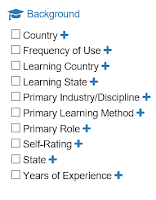With the new KnowledgeSmart skills matrix tool (currently under development) you will be able to capture the Qualifications, Certifications and Skill Levels of your staff in defined topics.
“Skills” is a collective term for an individual’s knowledge, qualifications, certifications and abilities. The Skills Record is populated from a Skills Survey, which is built using the Survey tool.
Surveys can easily be created which are purely Skills related. Skills specific Modules are assembled from the Skills Library questions. The construction of the Survey can be related to the role of the User. This way a Designer may receive a different Skill Survey compared to a Project Manager
You will have the ability to issue multiple Skills Surveys. For example, one on Engineering Software Skills, one on Microsoft software, one on Business Skills, etc.
This information will be used to,
1. Search for staff with specific Skills; required by the business for project, mentoring or training activities,
2. Identify strengths and weaknesses in staff Skill levels. This should inform training needs, and ensure training investments are made in the correct area
The benefits of the KnowledgeSmart skills matrix will stretch from the individual to the team, the organization and even to external clients.
So just where will you start? Identifying the core set of skills your project demands or team needs is a fundamental step to any skills matrix process.
When creating your list, include:
- Current skills or experience: The skills or experience that your team members use today to perform their role.
- Future skills or experience: Skills or experience that your team will need in the future as you plan to use new approaches or tools.
The first phase is then to issue a skills survey whereby you ask the individual team members to provide feedback as to how they rate themselves on these skills.
There are a number of different scales available but the most common one seems to be a 5-point scale

We hope to give you a little flexibility in designing your own scale.
Your skills defined in the first phase will help you structure your actual competency assessment.
This would be the skills assessment process already in place within your KnowledgeSmart admin dashboard.
The third phase is an interesting one and often overlooked. A KnowledgeSmart Skills Survey question can also be used to get information on the User’s interest level in a Skill. For example, a question on Revit Architecture competency could be followed by one on Revit Architecture level of interest, and/or desire for training.When people enjoy what they are doing productivity tends to rise speedily.
Survey options here might include the following two options:
- No interest in applying this skill or knowledge
- Interested in applying this skill or knowledge
We hope to have a way to allow a User’s Manager to approve the User’s self rating. A Skills Record will be created and stored for each KS User. It will be accessible though the KS Admin and User Dashboard, and through a Team Page or Dashboard for a Manager. Once this information is available the results can be populated on a matrix. Users will be able to log in to update Skills Surveys or view Skills Survey results.
What we are hoping to achieve with the new development is to build a bridge between the above results and actual skills assessment results. We have found it very often that a user's understanding of his own skill level is very different from actual results. Managers will then gain new insight in looking at the combination of the assessment result as well as the skills survey.
From a reporting perspectice the outputs we hope to deliver include a Skills Matrix, People or Talent Finder, Heat Maps and related charts. And in light of our big focus on Microsoft PowerBI we will also make sure there is a PowerBI friendly export.
The better the data the better the insight. We will keep you updated but hope to have this development live within the first quarter of 2019.









































